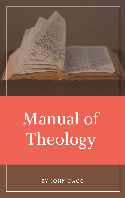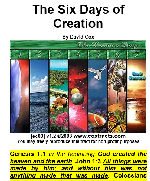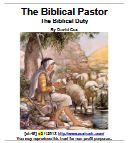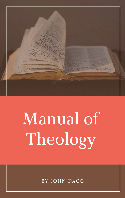Ads
Examining and Understanding
Theological Systems
Contents
Introduction
This website is an explanation of various different theological systems and perspectives (from my perspective as a Fundamental Baptist). It’s purpose is to help other people to understand and orientate their views and treatment of religious groups, beliefs, and practices.
This site is a companion site to | www.twmodules.com, my library site of Christian books for Bible study and sermon preparation. It is my desire to help people undertand the distinctive and differences as well as similarities between theological viewpoints, first so that they may be warned as to the error that may exist in these groups, and secondly to be able to benefit spiritually from what they have to offer.
Overview of this site and Theological Systems in General
The Importance of our Spiritual Authority
Introduction to Theological Systems
The Biblical Marks of Christianity
The Biblical Marks of a False Prophet
The Pre-New Testament Jewish System
Pagan Systems contemporary with the Jewish System
Modern Jewish Systems
Christianity during Christ’s Ministry
The Apostolic Church
The Post-Apostolic Church
-more to come-
Disclaimer
I suppose I should put a disclaimer on this site. I am a Fundamental, Independent Baptist missionary-pastor. This is my viewpoint. I have studied many different “theological systems” (cults, false religions, denominations, movements, etc, however you want to call them) and hopefully in all that I have studied and believe, somewhere, “true Christianity is in there.”
I would like to clarify an issue from the beginning. My spiritual authority is the Word of God, the 66 books of the Bible. I know many of the systems I will examine on this site claim the same thing, but I do not elevate religious traditions, logical deductions which pass the clear declarations and teaching of Scripture, and I disavow and denounce many of the conclusions and teachings of many religious groups. I would also clarify that there are a good many Baptists that I have met, studied their works and teachings, and likewise they are as lost as any pagan I will mention here. That is because they have “lost their foundations” which the majority or all of these groups have done.
My desire is not so much to “lambast” these groups (although I don’t have any grudges to bear, and I will tear into these false teachings with vigor to reveal what is wrong with them), but in many cases there is a lot “right with them.” This also I will try to bring out. I think it is more important to return to the theological roots of Holy Scripture, and anchor one’s self in that than to be loyal to a name, a denomination, a group, or a particular person (be that person very devout and holy or not).
From the very beginning, everybody will be mad at me and how I classify and understand and explain “their group”. Sorry. Let’s things fall as they may.
Understanding Fundamental Separation
I am a “Fundamentalist” and I like and claim the term “Separated”. But as I have studied “my own movement” I found elements of the same kind of spirit in groups that I would consider totally “pagan” or “false doctrine”. After meditation on this, I came to the conclusion, that their are counter-movements within many groups that probably are instigated by people that I would consider truly saved people in a lot of false doctrine and bad company. They show evidence of a “push” towards orthodoxy, but within a very bad group. Where they stand before the Lord I cannot judge, but God will. But my interest is in how and why they fight “to restore” what they perceive as wrong or unbiblical in their group. In essence this is seen most spectacularly in the Reformation, but this same spirit is one of exalting Scripture about the forces of error that have swallowed it.
To capture, study, and promote that spirit of loyalty to Scriptures (or the process, causes, and hindrances to that fall from loyalty to God) is what interests me in all these false groups.
How to Use a Biblical Research Library
The connection with these studies of these groups and my library at twmodules.com, is that there are great treasures in these religious books, and they can greatly benefit the Bible student, the evangelist, or pastor. At the same time they can be a great stumbling-block into heresy and error if one does not read discerningly. The young Christian, the young Bible Student, and the young pastor all have a great obstacle to overcome, because they cannot use “good study books” for their spiritual edification without having to deal with men of different persuasions and identifications (groups or denominations) and what do they do with this difference? Typically they ignore the differences and use the good in the book, or they reject the book/author “because he is not in my group.”
Take E.M. Bounds series of books on Prayer. What do you do with them? They are fantastic books on prayer that are unparalleled. E.M. Bounds was a Methodist, with his feet in the Deeper Life movement. A “Baptist” reads these books, and what does he do with them? They are excellent exhortations on Prayer, yet he is not “Baptist”. My personal attitude is to take the good and leave the bad, but you must understand the historical setting of these people, and moreover their spiritual setting, where they “are coming from” spiritually to understand their work.
Bounds and the Methodists are basically Arminianists, and they are going to have a heavy tendency towards human effort to accomplish God’s work, i.e. they believe that prayer really does change things. A Calvinist will not have “this strength”, and thus you just won’t find good strong exhortations on prayer by Calvinist-Reformed authors. This is where I am going then, we need to understand what is right with many of these groups (their strengths) and what is wrong (their weaknesses, and even their heresies and errors).
This website will seek to clearly outline where the movement of faith and practice has been from the Old Testament through the New Testament age, and into church history and up to modern church history.
What to do if you wish to refute my presentations and conclusions
You can write me at [email protected]
I will listen, but probably will not change much because you complain. Get your own website and express your position. This website is not seeking reconciliation of different groups and persuasions to make things “happy” between us, but to reveal the truth of God. Sorry if it hurts or is too strong for you.

Dagg Manual of Theology is a theology work in 2 volumes by J.L. Dagg a Reformed Southern Baptist. It is an extensive, very ample presentation of doctrines.
This is an extensive Bible Systematic Theology (Bible Doctrines book) from a conservative point of view.
Read/Download: now with pdf download link. 50,000 views on this page with download link








Hi David,
I love your work.
I will be praying that God sustains and blesses you.
Question: are you the same David Cox based at Dubbo Christian Family Church
Trevor
Excellent article. I definitely appreciate this website.
Keep writing!